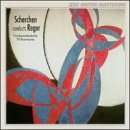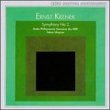| All Artists: Max Reger, Hermann Scherchen, Nordwestdeutsche Philharmonie Title: Scherchen conducts Reger Members Wishing: 0 Total Copies: 0 Label: Cpo Records Release Date: 1/25/1995 Genres: Pop, Classical Styles: Vocal Pop, Opera & Classical Vocal, Forms & Genres, Serenades & Divertimentos, Historical Periods, Modern, 20th, & 21st Century Number of Discs: 2 SwapaCD Credits: 2 UPCs: 4010115991434, 761203914326 |
Search - Max Reger, Hermann Scherchen, Nordwestdeutsche Philharmonie :: Scherchen conducts Reger
 | Max Reger, Hermann Scherchen, Nordwestdeutsche Philharmonie Scherchen conducts Reger Genres: Pop, Classical
|
Larger Image |
CD DetailsSimilar CDs |
CD ReviewsWonderful Introduction To An Under-Rated Composer Jeffrey Lipscomb | Sacramento, CA United States | 06/16/2005 (5 out of 5 stars) "My years of collecting classical records have led me down some curious paths. In some cases, exploring a composer's music has led to the discovery of a wonderful conductor. Such was the case with Heinz Bongartz (1894-1978), whom I discovered out of curiosity about the Bruckner 6th Symphony (his extraordinary recording of it is on Berlin Classics). But there have been even more occasions when interest in an already beloved performer has led me to composers that I might never have investigated otherwise. And that's precisely how I came to discover and love the orchestral works of Max Reger (1873-1916). Back around 1970 I read "Pages From A Musician's Life," the autobiography of conductor Fritz Busch up to the time he fled Germany in the early 1930's. He and his violinist brother Adolf are two artists that I admire deeply, and it became evident from reading this book that both of them worshiped Reger, whose music I didn't know at all. But strangely, many American critics write disparagingly of Reger's output, calling it things like "endless post-Wagnerian gush," "relentlessly chromatic," and even "bloated counterpoint." Well, many of these same nitwits say identical things about Bruckner, so I simply ignored them and plowed ahead. As it turns out, Reger's music has much in common with R. Strauss, Korngold and Pfitzner in its predilection for lyrical expression and rich harmonies. What on earth is wrong with that? Perhaps the best response to all those naysayers is the one Reger himself sent to a newspaper critic: "Sir: I am now seated in the smallest room of my house. Your review is before me. Soon it will be behind me." About this same time I became interested in the recordings of Dutch conductor Eduard van Beinum (specifically due to his brilliant Epic LPs of the Brahms 2nd and the Bruckner 8th). So I purchased Beinum's early 1950's recording (Decca LP) of Reger's "Variations and Fugue on a Theme of Mozart," and I fell in love with the music immediately. Then my enthusiasm for conductor F. Charles Adler's first-ever recordings of Mahler & Bruckner on the SPA LP label led me to Reger's "Variations and Fugue on a Theme of J. A. Hiller," a wonderfully jovial and good-natured work of which I am inordinately fond (that SPA LP needs to be on CD!). Fortunately, Konwitschny's recording of it is nearly as good, and that has been issued on a Berlin Classics CD. I soon lost interest in Beinum (other than those Brahms & Bruckner recordings, I now find Beinum too straightforward and rather impersonal). But my fascination with Bongartz led me to his LP of Reger's Mozart Variations & Fugue (much warmer and more expressive than Beinum's), and it has since been coupled with Reger's lovely Bocklin Suite on a Berlin Classics CD. There is another great Berlin Classics CD with Bongartz that has Reger's Sinfonietta, An die Hoffnung, and Hymnus der Liebe. Also along the way I picked up Eugen Jochum's outstanding account of the Serenade for Orchestra with the Berlin Philharmonic on a Urania LP. Finally, my interest in conductor Hans Rosbaud led me to his Odeon LP of Reger's delightful Piano Concerto, with soloist Erik Then-Bergh (not yet on CD). That piece reminds me strongly of the Burleske by Richard Strauss. By the time I bought this excellent CPO 2-disc CD set of Reger Orchestral Works, my purchase was based on my affection for BOTH the composer AND the conductor (Scherchen has long been one of my very favorites). So far as I know, none of these performances with the Nordwestdeutsche Philharmonie was ever released on LP. Everything here was recorded in 1960, and the sound is excellent. The Mozart Variations are beautifully done, a close match for the Bongartz and the fine "live" Schuricht account on Music & Arts (see my review). The Serenade is slightly cut but lovingly played. His Variations & Fugue on a Theme of Beethoven completely outclasses Jarvi's. And the comical Lustpiel Overture, the gorgeous Romantic suite, and the An die Hoffnung are played with the greatest affection by Scherchen. This CPO set is especially valuable now that Bongartz's CD accounts on Berlin Classics have been deleted. If you are looking for an introduction to Reger's orchestral pieces in good sound, these sympathetic performances will fit the bill very nicely. This composer's unique sound world is wonderfully captured here by Scherchen. Very Highly recommended. Jeff Lipscomb " An exception to Hannibal's DREADFUL review wallah | Baltimore | 06/24/2009 (5 out of 5 stars) "I take exception to Hannibal's DREADFUL review of this CD set. The sound is not "boomy." It is big, no mistake, but big isn't bad. The sound is deep, richly layered, and breathes magically. These recordings were made in 1960 and re-mastered in 1991. Given that, and given that neither Reger nor Scherchen have had their due of recognition, it's a shame that a reviewer would make a point of waving new listeners off of this wonderful collection. I've a hunch as to why he/she might have gotten so poor an impression of this music. Was it that the CD labels alert the listener (unnecessarily) to their being mono recordings? Perhaps Hannibal might have done better to listen first and read the labels later. These are beautiful recordings and lovely performances of Max Reger's rarely recorded orchestral music." Stunning Performances of an Underrated Compser Johannes Climacus | Beverly, Massachusetts | 01/12/2010 (5 out of 5 stars) "I purchased this 2-CD set largely on account of the conductor. I am a longstanding admirer of Scherchen, and until I saw this listing on the Amazon website, I was unaware that he had recorded anything by Reger or anything with this ensemble.
In the event, I was bowled over by the music. These recordings really put Reger on the map for me. I had previously heard only a few of his organ works (and found them intolerably pedantic) and his "Mozart Variations" (which I found mildly enjoyable through Böhm's monaural recoridng with the BPO). That work is included here--in a striking interpretation at least as fine as Böhm's (though not as well played). But it is the other pieces included in this set that I found even more enjoyable. The "Beethoven Variations" is clearly a major work, resourcefully orchestrated (as are all the other pieces in this set), and filled with astonishingly original invention as well as the contrapuntal mastery for which Reger was renowned. Even more fetching were the works on CD 1: a fizzing "Comedy Overture" reminiscent of Rezinek's "Dona Diana"; a gorgeous Serenade sounding for all the world like a cross between Dvorak and Delius; and finally a exquisitely crafted "Romantic Suite," inspired by Eichendorff's poetry, whose motto theme bears a striking resemblance to that which dominates Sibelius's Fourth Symphony, though the work as a whole is far less brooding in atmosphere than Sibelius's death-haunted work. Though tinged with melancholy, Reger's Suite proceeds from the bucolic to the boisterous over its four substantial movements. Indeed, in scope it is really a Symphony in all but name. Interestingly, Scherchen's performances are less idiosyncratic than one might have expected from him. Though I have no standards for comparison, except in the "Mozart Variations," Scherchen's tempos are not as eccentric as they could often be in more standard repertoire (e.g., that interminable trudge through the conluding "Amen" of Handel's Messiah), and the orchestral playing is surprisingly disciplined, given a less than world-class group and a conductor who, at least in his Westminster recordings, often tolerated slack ensemble (e.g., the hilariously out-of-sync harpsichord continuo in his recording of Handel's *Water Music*). Indeed, the playing throughout this set ranges from acceptable (in the two sets of orchestral variations) to splendid (in the works featured on CD I). The sound, too, is remarkably good for its age. I cannot recommend this set highly enough. All admirers of Scherchen's work should own it, for it must rank among his very finest recordings of late-romantic orchestral repertoire. Listeners who, like me, have avoided Reger on the assumption that his music is hopelessly convoluted, unbearably thick-textured, and unendurably ponderous, should also consider it, for it will occasion a transvaluation of a composer who may well be unjustly maligned." |

 Track Listings (8) - Disc #1
Track Listings (8) - Disc #1